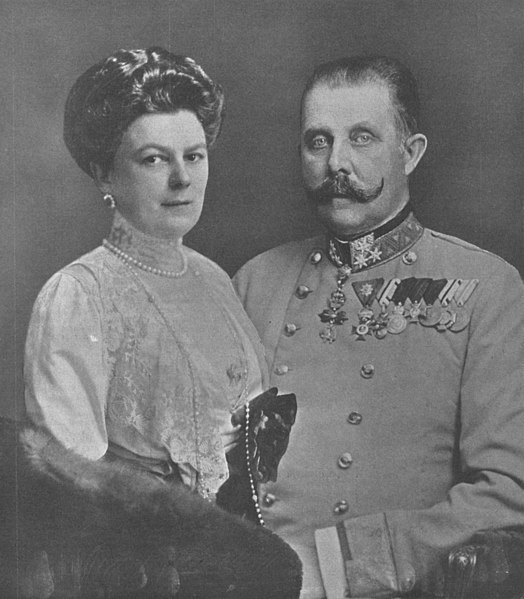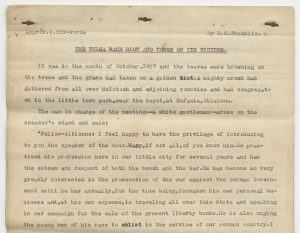Perhaps people are more familiar with Franz Ferdinand due to his assassination, which sparked World War I, yet, his life was full of controversial events.1 But actually, his marriage was an eventful occurrence that ignited controversy around the world, especially within the Austro-Hungarian royal family itself. The controversies surrounding Franz Ferdinand’s marriage raises a number of questions. Is it moral to disobey one’s parents’ wishes to marry someone? Who has the most prominent part of the decision when it comes to marriage? Can one marry whomever one desires? These questions were in Franz Ferdinand’s mind when he sought to marry Sophie Chotek—the woman he loved. Could he marry her, or would he have to submit to his family’s claims that she was not worthy of him?2 Even with the world against them, Franz Ferdinand completed his love story with Sophie Chotek through ambition, defiance, and love, which not only joined them, but also posed a menacing threat for them.

Born in 1863 at the Herberstein Palace in Graz, Archduke Franz Ferdinand was introduced into a world of nobility and luxury, as he was part of the royal family ruling the Austro-Hungarian Empire. Sophie, Duchess of Hohenberg, was born in 1868, into a family of aristocrats, who were quite distant from the social status held by the Archduke.3 The Archduke and Sophie married in 1900; people, especially the Archduke’s family, perceived Franz Ferdinand’s and Sophie Chotek’s marriage as one that mixed gold and lead. Even though the bride’s family was securely aristocratic, that did not compare to the titles that the groom and his family held. Consequently, one of the most famous morganatic marriages in history took place, that is, a marriage between two persons of uneven social status. In the case of Francis and Sophie, the offspring of the marriage, and Sophie herself, would be deprived of the rights and properties that would accrue to members of the royal family.4 Being an Archduke, Franz Ferdinand belonged to the royal family, holding all of the royal rights and privileges of that royal status; Sophie, the Duchess of Hohenberg, was merely blue blooded–aristocratic, with aristocratic rights and privileges–but not royal ones. And clearly to the royal family, Franz Ferdinand and Sophie Chotek were of unequal rankings. Therefore, according to the law, neither their children, nor Sophie, would ever be able to aspire to have a royal position in the Austro-Hungarian Empire.
This was just one of the consequences that Franz Ferdinand and his future family would have to endure, due to his morganatic marriage. But theirs was not the only case like this in this period of time. Other cases of famous morganatic marriages with major social impacts were: King Leopold and Caroline Lacroix, where the unconventional King of Belgium married a French singer he saw on the Parisian streets; the Archduke Charles and Elsa Czuber, another “disgraceful” marriage among the Habsburgs between a defiant Archduke (antagonized by Emperor Franz Joseph–similar to Franz Ferdinand’s case) and a mundane, second-rate actress; and the Grand Duke Paul and Olga Karnovitch, where the Russian Duke of the House of Romanoff was left a widower, so he wooed a married woman to be with him, until she divorced and married the Duke. Nonetheless, Archduke Franz Ferdinand and Sophie, Duchess of Hohenberg, carried out one of the most preeminent morganatic marriages, given the upheaval caused by Franz Ferdinand’s ambitious quest to marry Sophie.5

It is important to note that before Archduke Franz Ferdinand began his love odyssey, a series of convenient events took place. Indeed, Franz Ferdinand was son of Archduke Karl Ludwig, and nephew of Emperor Franz Joseph I; the probability of him becoming the next Emperor of Austria had been unlikely; but a plethora of improbable vicissitudes had happened that made the improbable a possibility. First, in 1889, the heir apparent (next in line for the throne), Crown Prince Rudolf, committed suicide for unknown reasons by pulling the trigger towards his mistress, and then proceeding to shoot himself. This unexpected, tragic, and unorthodox event left Franz Ferdinand’s father, Archduke Karl Ludwig as the heir apparent to the Austro-Hungarian throne. Finally, with Franz Ferdinand being heir presumptive (a potential heir to the throne), it literally took only a few days for Archduke Karl Ludwig to renounce his position, leaving Franz Ferdinand as the heir apparent under Emperor Franz Joseph I. As it would be, Franz Ferdinand, in a matter of days, ascended the royal ladder and became even more powerful than he was before, unknowingly setting a more difficult obstacle for his future marriage with his non-royal spouse.6
It was in Vienna, in the year 1894, that these two lovers met for the first time, at a masquerade ball at the Larish Palace; incidentally, this was on the day Franz Ferdinand was bound to ask Archduchess Gabrielle to marry him, the woman with whom their superiors had arranged for him to marry.7 However, the Archduchess was vexed by all the royal expectations of her future, regarding marriage and behavior, for example, and she wished to lead a normal life without following standards imposed on her. So, coincidentally, just as the Archduke was about to ask for her hand, Countess Sophie Chotek, waiting in line behind Archduchess Isabella, stepped into the room; Gabrielle’s salvation had arrived. In attempt to escape the royal marriage, Gabrielle introduced Sophie to the Archduke, and they instantly fell in love. Subsequently, Franz Ferdinand and Sophie met again, and this time, the Archduke asked Sophie to marry him, to which she replied saying that she was worried, since she was cognizant that she was not as royal as her imminent spouse. When Archduchess Isabella learned about this, she became infuriated and tried to expel Sophie from the emperor’s castle. Regardless, Franz Ferdinand obstinately rebelled against the family’s opinion and insisted in marrying Sophie, even if that meant taking a stand against his uncle, Emperor Franz Joseph I. At first, Franz Joseph I was in utter denial at the idea of the marriage, and he disliked Sophie for this, but in the end, he reluctantly allowed the marriage to take place, with the condition of it being morganatic—in its full connotation. Evidently, Franz Ferdinand fell in love with a woman disapproved by his family, and out of the many antagonists he gained by this, his uncle was the one with the most discontent towards the Archduke.8
Many years passed, and Sophie continued to be rejected by the royal family. In fact, Emperor Franz Joseph I abhorred the idea of his nephew’s marriage with a woman that, to his eyes, “shamed the dignity of the House of Habsburg.”9 In his defense, Franz Ferdinand countered the idea of marrying royalty with fellow royals by saying, “So it comes about that with us man and wife are always related to each other twenty times over. The result is that half of the children are idiots!”10 Hesitantly, the Emperor allowed the marriage. Soon after, on July 1, 1900, Archduke Franz Ferdinand and Sophie, Duchess of Hohenberg, rightfully married at Reichstadt. However, the Emperor decided to shame the heir presumptive’s marriage by not attending the wedding, and he treated his nephew’s family as nonexistent in the near future. Other members of the Habsburg family continued their reprimands against Sophie, angering the Archduke. For example, women of the court constantly said: “Don’t let her think she’s one of us!” And Sophie (even though she was as educated, beautiful and courteous) was often forced to walk on the left side of her husband to remind people of her unequal status. Regularly, Franz Ferdinand would confront people who insulted Sophie, regardless of their rankings, yet, nothing could make the romance between the now married couple recede.11
In 1913, after thirteen years of a happy marriage that produced one daughter and three sons, critics against Sophie continued to prevail, and Franz Ferdinand always decided to ignore such insults; he ignored all norms regarding Sophie and he always tried to sneak Sophie into reunions, high class parties, and balls that she was mostly left out of. Hence, one day, Franz Ferdinand was invited to meet with one of Franz Joseph’s confidants, and when this officer of high ranking learned that Franz Ferdinand intended to bring Sophie with him, he informed Franz Joseph, who had appointed Franz Ferdinand as inspector general of the armies. In an ill-fated invitation, Franz Ferdinand was sent to inspect army maneuvers at Sarajevo.12 This was set to happen in June of 1914, and Sophie was scared of this trip to the Bosnian capital, because Franz Ferdinand, as he began to prepare for his role as Emperor of the Austro-Hungarian Empire, had sympathized with the Slavs, gaining enemies from both the Pan-Serbian and Pan-German groups, including the hatred of Kaiser Wilhelm II of Germany.13

When the day came to leave Franz Ferdinand’s and Sophie’s magnificent home in Vienna, Franz Ferdinand was accompanied by his wife, since she feared her husband’s destiny once he set foot on a land where he was not popular among the people. They departed for Sarajevo, and on June 28, 1914, they started conducting the inspection tour. Unfortunately, while riding their car in the streets of Sarajevo, a nineteen-year-old Serbian nationalist, Gavrilo Princip, shot and killed both Franz Ferdinand and Sophie. This infamous event in history then triggered a series of events that escalated a month later into one of the most horrible wars in history, World War I.14
Definitely, the romance between Sophie Chotek and Franz Ferdinand had no boundaries, and Franz Ferdinand’s decision to marry someone outside royalty brought him condemnation by his own uncle, Emperor Franz Joseph I, and many others of that rank. This romance was incessant; the insults against his wife, the threats, the unstoppable mistreatment Sophie received, and certainly, not even death, could tear Franz Ferdinand and Sophie Chotek apart.
- Harlan Ullman, A Handful of Bullets: How the Murder of Archduke Franz Ferdinand Still Menaces the Peace (Annapolis, Maryland: Naval Institute Press, 2014), 1-6. ↵
- Richard Cavendish, “Birth of the Archduke Franz Ferdinand,” History Today 63, no. 12 (2013): 2. ↵
- Funk & Wagnalls New World Encyclopedia, 2018, s.v. “Francis Ferdinand.” ↵
- The Companion to British History, 2001, s.v. “Morganatic Marriage,” by Charles Arnold-Baker. ↵
- Charles Kingston, Famous Morganatic Marriages (England: S. Paul and Co, 1919), 5. ↵
- Richard Cavendish, “Birth of the Archduke Franz Ferdinand,” History Today 63, no. 12 (2013): 1-2. ↵
- Greg King and Sue Woolmans, The assassination of the archduke : Sarajevo 1914 and the romance that changed the world (New York: St. Martin’s Press, 2013), 43. ↵
- Charles Kingston, Famous Morganatic Marriages (England: S. Paul and co, 1919), 255-261, 268-270. ↵
- Greg King and Sue Woolmans, The assassination of the archduke : Sarajevo 1914 and the romance that changed the world (New York: St. Martin’s Press, 2013), 59. ↵
- Greg King and Sue Woolmans, The assassination of the archduke : Sarajevo 1914 and the romance that changed the world (New York: St. Martin’s Press, 2013), 35. ↵
- Greg King and Sue Woolmans, The assassination of the archduke: Sarajevo 1914 and the romance that changed the world (New York: St. Martin’s Press, 2013), 70-74. ↵
- Greg King and Sue Woolmans, The assassination of the archduke : Sarajevo 1914 and the romance that changed the world (New York: St. Martin’s Press, 2013), 163-164. ↵
- The Columbia Encyclopedia, 2018, s.v. “Francis Ferdinand,” by Paul Lagasse. ↵
- The Columbia Encyclopedia, 2018, s.v. “Francis Ferdinand,” by Paul Lagasse. ↵




48 comments
Valeria Perez
It is amazing to hear of this story when just this past summer Prince Harry married Meghan Markle! I think it is unfair that Sophie Chotek and her children were deprived of having the same rights as Archduke Franz Ferdinand. Though I do respect the Archduke for standing up for his wife an confronting people whenever they were rude to her regarding her status.
Mariah Garcia
I wasn’t aware that the assassination of Franz Ferdinand was the spark of World War I. I also wasn’t aware of these two people, Franz Ferdinand and Sophie Chotek, and their life story. It is such a tragic life for both of them. Ferdinand couldn’t marry someone who his family thought was unworthy and for Sophie who was mistreated for the marriage; both endured so much criticism for love. It is such a sad story and how it was handled by his family was poorly done.
Nathalie Herrera
This article has a great introduction that grabs the attention of the reader and flows nicely to tell the story of Franz Ferdinand. Nonetheless, the perspective in which the article was told is unique because it doesn’t simply talk about the assassination of Archduke Ferdinand but the hardships he had to face. Also, it is sad to read the mistreatment Sophie had to endure. Overall, great read!
Jennifer Salas
I only knew about Franz Ferdinand’s assassination and how it was one of the reasons why the war started, so reading this article was very interesting because I never knew how much criticism he faced. While reading this article I couldn’t help but think about his wife, Sophie who was often mistreated due to their marriage. I admire her strength because so many people criticized their marriage and she didn’t let that get to her.
Madison Downing
What a beautiful love story that stood literally against the world! This article was very informative and was a great joy to read. Who would have thought how despicable royal families could be with their statuses and how they viewed everyone around them. Sophie was a beautiful strong women that put up with all of it till the very end and it was admirable that she traveled with her husband to stay by his side because of the land he was traveling to. I find it so fantastic as well that Ferdinand would try to sneak her into events so she would never fell left out, their love truly stood the test of time.
Steven Hale
I think people typically imagine that it would be cool to grow up in a royal family, but as you said, there are some serious expectations about who you can and cannot associate with. It is surprising that Sophie was disliked for so long. After over a decade together, it seems reasonable to think that people would forget her Franz came from different social classes.
Lilliana Canales
I feel so bad for Sophie for receiving so much mistreatment. I’m happy to know that even though Ferdinand’s father didn’t approve of the marriage it still followed through. This is a very touching story and it’s very disappointing that Archduke Ferdinand was assassinated.
Greyson Addicott
The more one learns about the Archduke, the more he starts to view WW1 in a completely different light. Truly, Ferdinand did not deserve to die such a horrific death in the nation he was soon to inherit. The Austrians had a right to invade Sebia, as the government knew that the violent acts would only continue. What should have been a small war, a footnote in history, turned into something that no one will ever forget. The incident should have been no different, indeed, from Britain’s modern war over the Falkland islands.
Annissa Noblejas
Franz Ferdinand was to inherit a very unstable thrown. Considering how his life and ultimately his dead played out, I am personally glad he found love and fought for it. There is much to be said about a man who will face personal ridicule from his own family, simply for daring to fall in love at all. He went against the grain in politics and in love, proving in all aspects he was his own man and not one to be given orders.
Adam Portillo
I really enjoyed reading this article because I only knew Franz Ferdinand for being assasinated which triggered World War I. The article did a good job in portraying the personal life of Franz Ferdinand as well as showing how he countlessly stood up to people who opposed the marriage between him and Sofie. It’s interesting to see the many people who opposed the marriage but Franz Ferdinand ignored all of those people and went on to do what he really wanted to do. Awesome article.